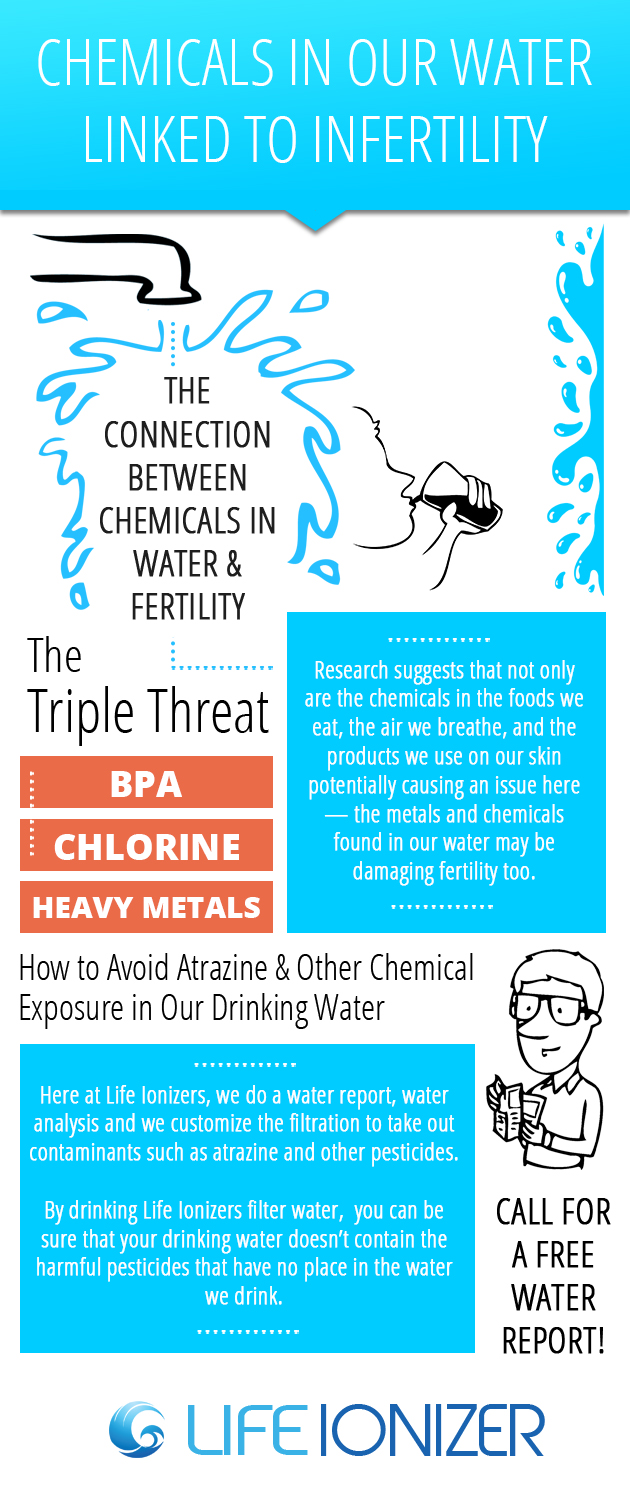Fertility struggles are something that millions of couples struggle with each year. In fact, statistics show that out of 100 couples in the US, 12 to 13 of them have difficulties conceiving. (1) And, it’s not only a large issue in the United States; fertility is on the decline worldwide. (2)
While there are numerous causes of infertility, there are some studies on how chemicals in water may be playing a much larger role than we think.
Ahead, we share exactly what you need to know and the steps you need to take to make sure that the water you drink is free from some particularly concerning chemicals.
The Connection Between Chemicals in Water & Fertility
With so many Americans struggling to conceive each year, many are starting to question what’s at the root of the problem. For many couples, they may have tried cleaning up their diets, living a more active lifestyle, and cutting out unhealthy habits, but one thing we often overlook is what’s lurking in our drinking water.

Research suggests that not only are the chemicals in the foods we eat, the air we breathe, and the products we use on our skin potentially causing an issue here — the metals and chemicals found in our water may be damaging fertility too. (3)
Many of these toxicants have been linked to low sperm count and have been shown to negatively affect female fertility by disrupting ovulation and even implantation. (4)
Let’s take a closer look at some of the hidden dangers in water and the negative effects it’s known to have on fertility.
- Chlorine: Studies suggest that drinking chlorinated water may increase the risk of still-birth, and research suggests that it may also increase the risk of giving birth to a baby with smaller body lengths as well as a smaller head circumference. (5)
- BPA: We all know about BPA as it relates to plastic, but did you know that it’s commonly found in drinking water too? BPA or bisphenol A, has been shown to negatively affect implantation in women who were undergoing IVF therapy. (6)
- Heavy Metals: Things like mercury and cadmium have also been linked to fertility issues and preterm labor. (7)
The Effects of Pesticides in Water
Pesticides in water are another big concern when it comes to fertility. The research shows us that pesticide exposure decreases fertility, with pesticides like glyphosate, dicamba, and organophosphates having an extremely negative impact. Studies have also shown that men who consume fruits and vegetables with pesticide residue experienced a reduction in sperm count. (8)
What this tells us is that we need to eliminate our exposure to pesticides as best we can, and removing it from the water we drink is a key part of keeping our exposure low.
The Dangers of Atrazine
The effects of pesticides in water are widespread, and perhaps one of those most shocking negative effects on fertility comes from atrazine in water.
So, what is atrazine? Atrazine is an herbicide and the most commonly used pesticide in the world. It’s also the pesticide that’s most commonly detected in our drinking water. Not only is it a harmful chemical, but it’s an endocrine disruptor that studies have shown to have serious reproductive risks. (9)
An animal study found that atrazine caused low testosterone and decreased fertility in male frogs. It also decreased the production of sperm, proving just how detrimental this herbicide is to not only fertility but overall health. (10)
What is Atrazine Found in?
Knowing this information about the dangers of atrazine, how do you go about avoiding it? For one, it’s important to know what atrazine is found in.
Since it’s the most commonly used pesticide worldwide, you may be exposed to it if you live near areas where certain crops are grown like pineapple, corn, sugarcane, and sorghum — atrazine is commonly applied to these crops. (11)
And, as mentioned, it’s also commonly found in drinking water, so removing it from the water you drink is key.
How to Avoid Atrazine & Other Chemical Exposure in Our Drinking Water
We know the damaging effects of pesticides in water, but how do you go about avoiding them? Using a water filter that filters them out is one of the best and most cost-effective ways to make sure you aren’t unintentionally exposing yourself to these fertility and endocrine-disrupting pesticides.
And, not only is clean and safe drinking water an essential part of supporting fertility, but it’s also a key part of supporting optimal health.
Here at Life Ionizers, we do a water report, water analysis and we customize the filtration to take out contaminants such as atrazine and other pesticides. By drinking Life Ionizers filter water, you can be sure that your drinking water doesn’t contain the harmful pesticides that have no place in the water we drink.
Call now for a free water report!
- https://www.hhs.gov/opa/reproductive-health/fact-sheets/female-infertility/index.html
(2, 3, 4, 5, 6, 7, 8) https://www.ncbi.nlm.nih.gov/pmc/articles/PMC6396757/
(9) https://www.ncbi.nlm.nih.gov/pmc/articles/PMC2842049/
(10) https://www.ncbi.nlm.nih.gov/pmc/articles/PMC2842049/
(11) https://www.atsdr.cdc.gov/phs/phs.asp?id=336&tid=59
